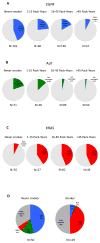Smoking status and self-reported race affect the frequency of clinically relevant oncogenic alterations in non-small-cell lung cancers at a United States-based academic medical practice
- PMID: 23932486
- PMCID: PMC3800098
- DOI: 10.1016/j.lungcan.2013.07.013
Smoking status and self-reported race affect the frequency of clinically relevant oncogenic alterations in non-small-cell lung cancers at a United States-based academic medical practice
Abstract
Introduction: The identification of somatic genomic aberrations in non-small-cell lung cancer (NSCLC) is part of evidence-based practice guidelines for care of patients with NSCLC. We sought to establish the frequency and correlates with these changes in routine patient-tumor sample pairs.
Methods: Clinicopathologic data and tumor genotype were retrospectively compiled and analyzed from an overall cohort of 381 patient-tumor samples.
Results: Of these patients, 75.9% self-reported White race, 13.1% Asian, 6.5% Black, 27.8% were never-smokers, 54.9% former-smokers and 17.3% current-smokers. The frequency of EGFR mutations was 23.9% (86/359), KRAS mutations 34.2% (71/207) and ALK FISH positivity 9.1% (23/252) in tumor samples, and almost all had mutually exclusive results for these oncogenes. In tumors from White, Black and Asian patients, the frequencies of EGFR mutations were 18.4%, 18.2% and 62%, respectively; of ALK FISH positivity 7.81%, 0% and 14.8%, respectively; and of KRAS mutations 41.6%, 20% and 0%. These patterns changed significant with increasing pack-year history of smoking. In White patients, the frequencies of EGFR mutations and ALK FISH positivity decreased with increasing pack-year cohorts; while the frequencies of KRAS mutations increased. Interestingly, in Asian patients the frequencies of EGFR mutations were similar in never smokers and in the cohorts with less than 45pack-year histories of smoking and only decreased in the 45pack-year plus cohort.
Conclusions: The frequencies of somatic EGFR, KRAS, and ALK gene abnormalities using routine lung cancer tissue samples from our United States-based academic medical practice reflect the diverse ethnicity (with a higher frequency of EGFR mutations in Asian patients) and smoking patterns (with an inverse correlation between EGFR mutation and ALK rearrangement) of our tested population. These results may help other medical practices appreciate the expected results from introduction of routine tumor genotyping techniques into their day-to-day care of NSCLC.
Keywords: ALK; Anaplastic lymphoma kinase; EGFR; Epidermal growth factor receptor; KRAS; Lung cancer; Never smokers; Non-small-cell lung cancer.
Copyright © 2013 Elsevier Ireland Ltd. All rights reserved.
Conflict of interest statement
Daniel B. Costa has received consulting fees from Pfizer, Roche and AstraZeneca. Paul A. VanderLaan, Erik Folch, David H. Boucher, Hannah M. Canepa, Michael S. Kent, Sidharta P. Gangadharan, Adnan Majid, Olivier N. Kocher, Michael A. Goldstein, Mark S. Huberman have no conflicts to disclose. No other conflict of interest is stated.
Figures


References
-
- Cheng L, Alexander RE, Maclennan GT, Cummings OW, Montironi R, Lopez-Beltran A, et al. Molecular pathology of lung cancer: key to personalized medicine. Mod Pathol. 2012;25(3):347–369. - PubMed
-
- Rosell R, Carcereny E, Gervais R, Vergnenegre A, Massuti B, Felip E, et al. Erlotinib versus standard chemotherapy as first-line treatment for European patients with advanced EGFR mutation-positive non-small-cell lung cancer (EURTAC): a multicentre, open-label, randomised phase 3 trial. Lancet Oncol. 2012;13(3):239–246. - PubMed
-
- Keedy VL, Temin S, Somerfield MR, Beasley MB, Johnson DH, McShane LM, et al. American Society of Clinical Oncology provisional clinical opinion: epidermal growth factor receptor (EGFR) Mutation testing for patients with advanced non-small-cell lung cancer considering first-line EGFR tyrosine kinase inhibitor therapy. J Clin Oncol. 2011;29(15):2121–2127. - PubMed
Publication types
MeSH terms
Substances
Grants and funding
LinkOut - more resources
Full Text Sources
Other Literature Sources
Medical
Research Materials
Miscellaneous

